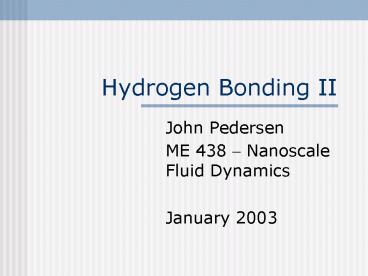Hydrogen Bonding II - PowerPoint PPT Presentation
1 / 10
Title:
Hydrogen Bonding II
Description:
Hummer, G., Rasaiah, J.C. and J.P. Noworyta. ... Hummer (Nature) Overview. Nanotube (13.4 A long, 8.1 A dia) floating free in a ... Hummer (Nature) Results ... – PowerPoint PPT presentation
Number of Views:70
Avg rating:3.0/5.0
Title: Hydrogen Bonding II
1
Hydrogen Bonding II
- John Pedersen
- ME 438 Nanoscale Fluid Dynamics
- January 2003
2
Articles
- Hummer, G., Rasaiah, J.C. and J.P. Noworyta.
Water conduction through the hydrophobic channel
of a carbon nanotube. Nature. 414 188-190
(2001). - Truskett, T.M., Debenedetti, P.G. and S.
Torquato. Thermodynamic implications of
confinement for a water like fluid. Journal of
Chemical Physics. 1142401-2418 (2001).
3
Hummer (Nature) Overview
- Nanotube (13.4 A long, 8.1 A dia) floating free
in a water bath. 144 carbon atoms - Water modeled as potential functions (TIP3P)
1034 of these - Molecular dynamics simulation 66 ns sim time,
time step was 2 fs. - Algorithm is AMBER 6.0
Figure 1c from Hummer et al.
4
Hummer (Nature) Background
- Water molecules entering nanotube lose 2 of 4
hydrogen bonds filling of tube energetically
unfavorable - Hydrogen bonds of molecules inside tube are
shielded from molecular fluctuations average
bond lifetime is 5.6 ps vs. 1.0 ps for bulk water - Water is restricted to bond essentially along
nanotube axis retains entropy due to ability to
rotate around bonds
5
Hummer (Nature) Results
Red is normal carbon-water interaction, blue is
modified for weakened van der Waals tube/water
interaction
6
Hummer (Nature) Results (2)
- Flow average was 17 water molecules/nanosecond
51x10-14 cm3/s measured water flow through
transmembrane protein aquaporin-1 - Flow occurred in bursts rupturing the hydrogen
bonds in the water chain is energetically costly
and thus rare.
7
Truskett (J Chem Phys) Overview
- Water molecules are hard spheres with hydrogen
bond directions - Water can interact via van der Waals with wall,
but cannot bond with wall - Two confinement effects shown by theory in this
paper - Confinement reduces favorable H-bonding/ molecule
? liquid-liquid critical point moves to lower T,
higher r, higher P (also inhibits freezing) - Confinement introduces density modulations into
fluid film
8
Truskett (J Chem Phys) Pictures
Figures 2 and 3 from Truskett et al.
9
Truskett (J Chem Phys) Results
Figures from Truskett et al.
10
Truskett (J Chem Phys) Results (2)
Figures from Truskett et al.































